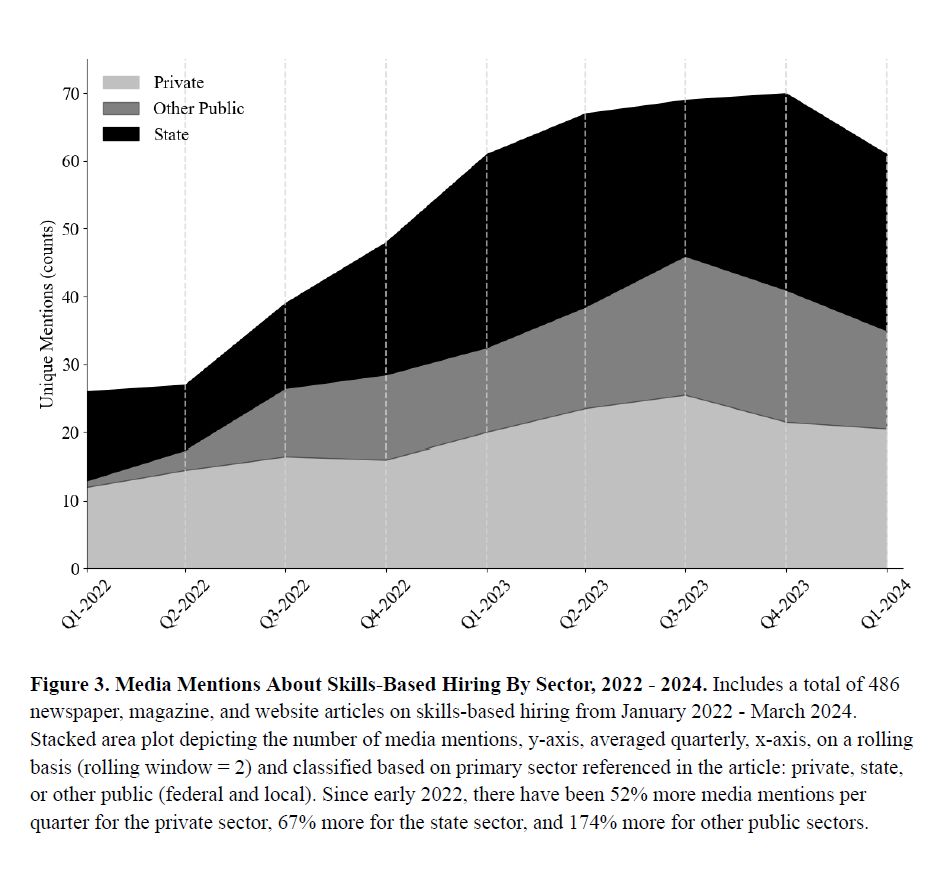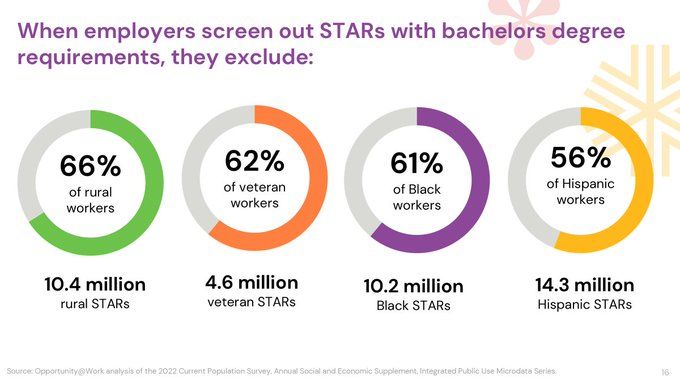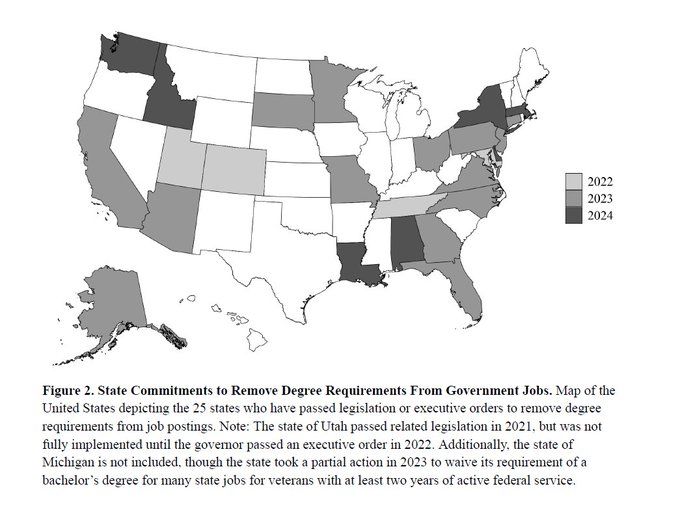Prof. Peter Q. Blair
@pqblair.bsky.social
Dr. Peter Q. Blair | Faculty @Harvard Grad School of Ed | Co-Director, Harvard Project on Workforce
🔬 Research: Economics of education, labor, public policy, & digitization
📊 NBER Faculty Research Associate | PI of BE-Lab
🇺🇸 Volunteer Economist, Biden-
🔬 Research: Economics of education, labor, public policy, & digitization
📊 NBER Faculty Research Associate | PI of BE-Lab
🇺🇸 Volunteer Economist, Biden-
10/ Thanks to funders, research partners Opportunity@Work, Gates Foundation, Harvard, HGSE and the state officials and legislatures creating more opportunity for STARs.
December 9, 2024 at 9:26 PM
10/ Thanks to funders, research partners Opportunity@Work, Gates Foundation, Harvard, HGSE and the state officials and legislatures creating more opportunity for STARs.
We’ll continue monitoring how these policies evolve and their broader labor market impacts. Let’s keep working toward a future where the skills of all workers are the keys to economic opportunity in the US.
📄 Read the paper here: www.nber.org/papers/w33220
📄 Read the paper here: www.nber.org/papers/w33220
www.nber.org
December 9, 2024 at 9:26 PM
We’ll continue monitoring how these policies evolve and their broader labor market impacts. Let’s keep working toward a future where the skills of all workers are the keys to economic opportunity in the US.
📄 Read the paper here: www.nber.org/papers/w33220
📄 Read the paper here: www.nber.org/papers/w33220
8/ Big Picture:
Public-sector innovations like removing degree requirements where unnecessary, have historically activated new sources of talented of workers in the US labor market, e.g. the full integration of women and minority workers into the workforce.
Public-sector innovations like removing degree requirements where unnecessary, have historically activated new sources of talented of workers in the US labor market, e.g. the full integration of women and minority workers into the workforce.
December 9, 2024 at 9:26 PM
8/ Big Picture:
Public-sector innovations like removing degree requirements where unnecessary, have historically activated new sources of talented of workers in the US labor market, e.g. the full integration of women and minority workers into the workforce.
Public-sector innovations like removing degree requirements where unnecessary, have historically activated new sources of talented of workers in the US labor market, e.g. the full integration of women and minority workers into the workforce.
7/ Impact for STARs:
Our analysis estimates that these policies increased middle- and high-wage job openings for STARs in adopting states!
Our analysis estimates that these policies increased middle- and high-wage job openings for STARs in adopting states!

December 9, 2024 at 9:26 PM
7/ Impact for STARs:
Our analysis estimates that these policies increased middle- and high-wage job openings for STARs in adopting states!
Our analysis estimates that these policies increased middle- and high-wage job openings for STARs in adopting states!
6/ Public Awareness of STARs:
Our text analysis shows a 67% rise in state-level mentions of "skills-based hiring" since 2022. The public sector is leading the charge on increasing awareness about STARs. 📰
Our text analysis shows a 67% rise in state-level mentions of "skills-based hiring" since 2022. The public sector is leading the charge on increasing awareness about STARs. 📰


December 9, 2024 at 9:26 PM
6/ Public Awareness of STARs:
Our text analysis shows a 67% rise in state-level mentions of "skills-based hiring" since 2022. The public sector is leading the charge on increasing awareness about STARs. 📰
Our text analysis shows a 67% rise in state-level mentions of "skills-based hiring" since 2022. The public sector is leading the charge on increasing awareness about STARs. 📰
5/ Why Does this Matter?
STARs represent over 70 million U.S. workers who gain skills through work experience, as in the Becker Model of Human Capital.
Historically, these workers have been overlooked for many public-sector roles by degree filters.
#STARs #FutureofWork
STARs represent over 70 million U.S. workers who gain skills through work experience, as in the Becker Model of Human Capital.
Historically, these workers have been overlooked for many public-sector roles by degree filters.
#STARs #FutureofWork

December 9, 2024 at 9:26 PM
5/ Why Does this Matter?
STARs represent over 70 million U.S. workers who gain skills through work experience, as in the Becker Model of Human Capital.
Historically, these workers have been overlooked for many public-sector roles by degree filters.
#STARs #FutureofWork
STARs represent over 70 million U.S. workers who gain skills through work experience, as in the Becker Model of Human Capital.
Historically, these workers have been overlooked for many public-sector roles by degree filters.
#STARs #FutureofWork
4/ Key Findings:
States adopting these policies reduced bachelor's degree requirements in job postings by 2.5-3 percentage points annually.
This shift translates to thousands of new opportunities for STARs previously screened out by degree requirements!
States adopting these policies reduced bachelor's degree requirements in job postings by 2.5-3 percentage points annually.
This shift translates to thousands of new opportunities for STARs previously screened out by degree requirements!

December 9, 2024 at 9:26 PM
4/ Key Findings:
States adopting these policies reduced bachelor's degree requirements in job postings by 2.5-3 percentage points annually.
This shift translates to thousands of new opportunities for STARs previously screened out by degree requirements!
States adopting these policies reduced bachelor's degree requirements in job postings by 2.5-3 percentage points annually.
This shift translates to thousands of new opportunities for STARs previously screened out by degree requirements!
3/ Background
Policy changes builds on 3 prior NBER WP on STARs, where we show that:
1. STARs have skills: www.nber.org/papers/w26844
2. STARs face friction moving to high wage work: www.nber.org/papers/w28991
3. Degrees don't eliminate occupational segregation: www.nber.org/papers/w31641
Policy changes builds on 3 prior NBER WP on STARs, where we show that:
1. STARs have skills: www.nber.org/papers/w26844
2. STARs face friction moving to high wage work: www.nber.org/papers/w28991
3. Degrees don't eliminate occupational segregation: www.nber.org/papers/w31641
www.nber.org
December 9, 2024 at 9:26 PM
3/ Background
Policy changes builds on 3 prior NBER WP on STARs, where we show that:
1. STARs have skills: www.nber.org/papers/w26844
2. STARs face friction moving to high wage work: www.nber.org/papers/w28991
3. Degrees don't eliminate occupational segregation: www.nber.org/papers/w31641
Policy changes builds on 3 prior NBER WP on STARs, where we show that:
1. STARs have skills: www.nber.org/papers/w26844
2. STARs face friction moving to high wage work: www.nber.org/papers/w28991
3. Degrees don't eliminate occupational segregation: www.nber.org/papers/w31641
2/ Context
In the last 2 years, 25 states have moved to reduce unnecessary degree requirements for public-sector jobs. These policies aim to open doors for workers Skilled Through Alternative Routes (STARs) 🚪✨.
In the last 2 years, 25 states have moved to reduce unnecessary degree requirements for public-sector jobs. These policies aim to open doors for workers Skilled Through Alternative Routes (STARs) 🚪✨.

December 9, 2024 at 9:26 PM
2/ Context
In the last 2 years, 25 states have moved to reduce unnecessary degree requirements for public-sector jobs. These policies aim to open doors for workers Skilled Through Alternative Routes (STARs) 🚪✨.
In the last 2 years, 25 states have moved to reduce unnecessary degree requirements for public-sector jobs. These policies aim to open doors for workers Skilled Through Alternative Routes (STARs) 🚪✨.
5/ Why Does this Matter?
STARs represent over 70 million U.S. workers who gain skills through work experience, as in the Becker Model of Human Capital.
Historically, these workers have been overlooked for many public-sector roles by degree filters.
#STARs #FutureofWork
STARs represent over 70 million U.S. workers who gain skills through work experience, as in the Becker Model of Human Capital.
Historically, these workers have been overlooked for many public-sector roles by degree filters.
#STARs #FutureofWork

December 9, 2024 at 9:17 PM
5/ Why Does this Matter?
STARs represent over 70 million U.S. workers who gain skills through work experience, as in the Becker Model of Human Capital.
Historically, these workers have been overlooked for many public-sector roles by degree filters.
#STARs #FutureofWork
STARs represent over 70 million U.S. workers who gain skills through work experience, as in the Becker Model of Human Capital.
Historically, these workers have been overlooked for many public-sector roles by degree filters.
#STARs #FutureofWork
4/ Key Findings:
States adopting these policies reduced bachelor's degree requirements in job postings by 2.5-3 percentage points annually.
This shift translates to thousands of new opportunities for STARs previously screened out by degree requirements!
States adopting these policies reduced bachelor's degree requirements in job postings by 2.5-3 percentage points annually.
This shift translates to thousands of new opportunities for STARs previously screened out by degree requirements!

December 9, 2024 at 9:17 PM
4/ Key Findings:
States adopting these policies reduced bachelor's degree requirements in job postings by 2.5-3 percentage points annually.
This shift translates to thousands of new opportunities for STARs previously screened out by degree requirements!
States adopting these policies reduced bachelor's degree requirements in job postings by 2.5-3 percentage points annually.
This shift translates to thousands of new opportunities for STARs previously screened out by degree requirements!
3/ State Policy changes builds on 3 prior NBER WP on STARs, where we show that:
1. STARs have skills: nber.org/papers/w26844
2. STARs face friction moving to high wage work: nber.org/papers/w28991
3. Degrees don't eliminate occupational segregation:
1. STARs have skills: nber.org/papers/w26844
2. STARs face friction moving to high wage work: nber.org/papers/w28991
3. Degrees don't eliminate occupational segregation:
nber.org
December 9, 2024 at 9:17 PM
3/ State Policy changes builds on 3 prior NBER WP on STARs, where we show that:
1. STARs have skills: nber.org/papers/w26844
2. STARs face friction moving to high wage work: nber.org/papers/w28991
3. Degrees don't eliminate occupational segregation:
1. STARs have skills: nber.org/papers/w26844
2. STARs face friction moving to high wage work: nber.org/papers/w28991
3. Degrees don't eliminate occupational segregation:
2/ Context
In the last 2 years, 25 states have moved to reduce unnecessary degree requirements for public-sector jobs. These policies aim to open doors for workers Skilled Through Alternative Routes (STARs) 🚪✨
In the last 2 years, 25 states have moved to reduce unnecessary degree requirements for public-sector jobs. These policies aim to open doors for workers Skilled Through Alternative Routes (STARs) 🚪✨

December 9, 2024 at 9:17 PM
2/ Context
In the last 2 years, 25 states have moved to reduce unnecessary degree requirements for public-sector jobs. These policies aim to open doors for workers Skilled Through Alternative Routes (STARs) 🚪✨
In the last 2 years, 25 states have moved to reduce unnecessary degree requirements for public-sector jobs. These policies aim to open doors for workers Skilled Through Alternative Routes (STARs) 🚪✨

